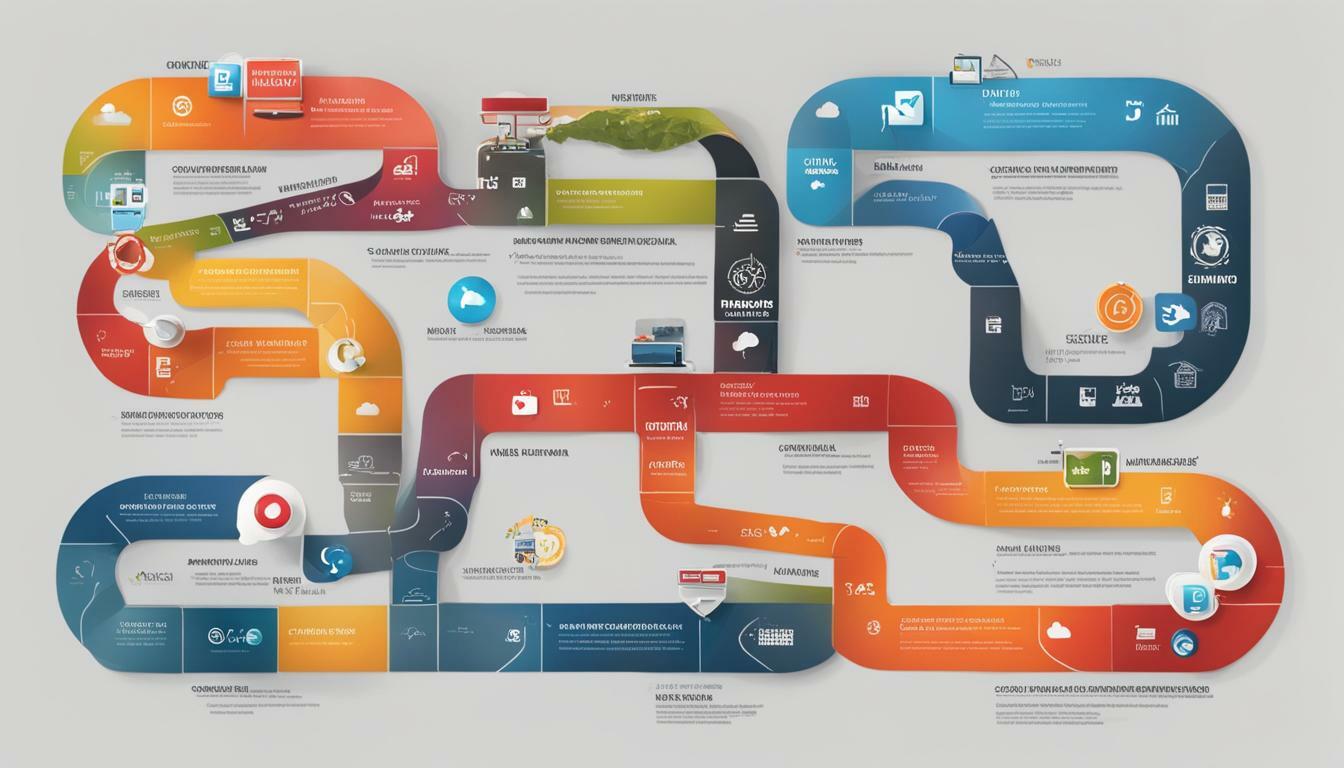Social media marketing and content marketing are two distinct practices that play important roles in a brand’s marketing strategy. While they are often used together, it’s essential to understand the key differences between the two.
Content marketing involves the creation and distribution of original and valuable content to attract and educate target audiences. The goal is to establish a brand as an authority in its field and build brand awareness. Content marketing focuses on providing informative and engaging material to potential customers, with the ultimate aim of encouraging conversions.
On the other hand, social media marketing primarily relies on various social media platforms to establish a two-way dialogue with consumers. The focus is on building a more intimate relationship with the target audience by fostering interaction and maintaining a responsive and personable brand image. Social media marketing aims to increase brand engagement and loyalty through effective communication and community building.
It’s important to note that content marketing and social media marketing are not synonymous. Content marketing is a tactic that involves creating and distributing valuable content, while social media marketing serves as a channel for communication and engagement with the audience.
Key Takeaways:
- Content marketing focuses on creating valuable content to attract and educate target audiences.
- Social media marketing involves using social media platforms to establish a two-way dialogue with consumers.
- Content marketing aims to establish a brand as an authority in its field and build brand awareness.
- Social media marketing focuses on increasing brand engagement and loyalty through effective communication and community building.
- Both strategies can be effective and are often used together in a brand’s marketing strategy.
What is Content Marketing?
Content marketing involves creating and distributing relevant, valuable, and consistent content to attract and engage a specific audience. It focuses on providing information and resources that educate, entertain, or inspire the target audience, rather than directly promoting a product or service.
The key objective of content marketing is to build trust and establish a brand as an industry thought leader. By consistently delivering high-quality content, businesses can demonstrate their expertise and credibility, which in turn attracts and retains a loyal audience. This can lead to increased brand awareness, organic search traffic, and ultimately, conversions.
To successfully execute a content marketing strategy, businesses must first identify their target audience and understand their needs, preferences, and pain points. This allows them to create content that resonates with their audience and provides value. Content can take various forms, such as blog posts, videos, infographics, whitepapers, podcasts, or social media posts.
By adopting a content marketing approach, businesses can position themselves as valuable resources and build long-term relationships with their audience. It enables them to establish authority, nurture leads, and guide customers through their purchasing journey. Content marketing also offers the flexibility to adapt and evolve with changing market trends, ensuring continued relevance and success.
| Benefits of Content Marketing |
|---|
| 1. Increased brand awareness and visibility |
| 2. Improved search engine rankings and organic traffic |
| 3. Enhanced brand reputation and credibility |
| 4. Increased audience engagement and interaction |
| 5. Higher lead generation and conversion rates |
What is Social Media Marketing?
Social media marketing is a practice that involves utilizing social media platforms to connect with and engage a target audience. It utilizes the power of platforms such as Facebook, Instagram, Twitter, and LinkedIn to establish brand presence, drive website traffic, and foster relationships with potential customers. By creating and sharing relevant and engaging content, businesses can attract attention, encourage interaction, and ultimately, drive conversions.
Benefits of Social Media Marketing
Social media marketing offers a range of benefits for businesses striving to reach their target audience. Firstly, it provides a cost-effective way to promote products and services, as creating and sharing content on social media platforms is often free or requires minimal investment. Additionally, social media marketing allows for precise targeting, enabling businesses to reach specific demographics and interest groups. This level of targeting ensures that businesses are reaching the right audience, maximizing their chances of conversion.
Furthermore, social media marketing allows for real-time interaction with customers. It provides a platform for receiving feedback, addressing concerns, and building a strong brand presence. By engaging in conversations, businesses can humanize their brand and establish a personal connection with their audience. This not only increases brand loyalty but also encourages word-of-mouth marketing, as satisfied customers are more likely to share their positive experiences with others.
How to Choose Between Social Media Marketing and Content Marketing
When deciding between social media marketing and content marketing, it’s essential to consider your business goals and target audience. Content marketing is ideal for businesses looking to establish themselves as thought leaders in their industry and provide valuable information to their audience. On the other hand, social media marketing is best suited for businesses aiming to build brand awareness, increase engagement, and connect with their target audience on a more personal level.
Ultimately, the best approach is to integrate both strategies. By combining content marketing and social media marketing, businesses can leverage the benefits of both practices. Content marketing serves as the foundation for establishing expertise and attracting an audience, while social media marketing provides the platform for engagement and relationship-building. Together, these two strategies can create a holistic digital marketing approach that drives results and contributes to the overall success of a brand.
| Content Marketing | Social Media Marketing |
|---|---|
| Focuses on creating valuable and original content | Uses social media platforms to connect with the audience |
| Goal is to attract and educate target audiences | Goal is to build brand engagement and loyalty |
| Establishes brand as an authority in the industry | Fosters a responsive and personable brand image |
| Key tactic for driving brand awareness and conversions | Key channel for communication and relationship-building |
Combining Social Media Marketing and Content Marketing
By combining social media marketing and content marketing strategies, businesses can create a powerful marketing approach that leverages the strengths of both practices. Content marketing, with its focus on creating valuable and original content, helps establish a brand as an authority in its field. This can be achieved through blog posts, articles, ebooks, and other forms of content that provide insightful information to a target audience. On the other hand, social media marketing allows businesses to engage with their audience on a more personal level, fostering a sense of community and building brand loyalty.
One way businesses can combine these strategies is by using social media platforms to distribute and promote their content. By sharing blog posts or articles on social media, businesses can reach a wider audience and drive more traffic to their website. This not only increases brand visibility but also allows businesses to establish themselves as thought leaders in their industry.
Additionally, social media platforms provide an opportunity to amplify the reach and impact of content marketing efforts. By sharing valuable and engaging content on social media regularly, businesses can increase brand engagement and spark conversations with their audience. This allows for a deeper level of interaction and helps to humanize the brand, making it more relatable and trustworthy in the eyes of consumers. Social media also provides a platform for users to share and recommend content, further expanding its reach and potential impact.
Table: Benefits of Combining Social Media Marketing and Content Marketing
| Benefits | Social Media Marketing | Content Marketing |
|---|---|---|
| Increased brand visibility | ✓ | ✓ |
| Establishment of brand authority | ✓ | ✓ |
| Higher engagement and brand loyalty | ✓ | |
| Expanded reach and potential impact | ✓ | |
| Increased website traffic | ✓ |
In conclusion, combining social media marketing and content marketing can yield significant benefits for businesses. By leveraging the strengths of both practices, businesses can enhance brand visibility, establish themselves as authorities in their field, and foster higher engagement and brand loyalty. Through the distribution and promotion of valuable content on social media platforms, businesses can amplify the impact of their content marketing efforts and reach a wider audience. By integrating these strategies, businesses can create a comprehensive and effective marketing approach that drives results.
Conclusion
In conclusion, social media marketing and content marketing are two distinct but complementary practices that can work together to achieve a brand’s marketing goals.
Content marketing involves creating original and valuable content to attract and educate target audiences, with the aim of increasing brand awareness and encouraging conversions. By establishing a brand as an authority in its field, content marketing helps build credibility and trust with consumers.
On the other hand, social media marketing focuses on utilizing various social media platforms to engage in a two-way dialogue with consumers. It allows brands to foster a responsive and personable image, thereby increasing brand engagement and loyalty.
While content marketing is a tactic that helps establish a brand’s expertise, social media marketing serves as a channel for communication. Both strategies have their unique benefits and can be effective in achieving specific business goals. However, integrating these practices can maximize results by leveraging the strengths of each approach.
FAQ
What is the difference between social media marketing and content marketing?
Social media marketing involves using various social media platforms to establish a two-way dialogue with consumers and build brand engagement, while content marketing focuses on creating valuable and original content to attract and educate target audiences. They have different strategies and goals, but can also be combined for maximum impact.
What is content marketing?
Content marketing is the practice of creating original and valuable content to attract and educate target audiences. It aims to grow brand awareness and encourages conversions by establishing the brand as an authority in its field.
What is social media marketing?
Social media marketing involves using various social media platforms to establish a two-way dialogue with consumers. Its goal is to build a more intimate relationship with the audience, increase brand engagement, and foster a responsive and personable brand image.
How can social media marketing and content marketing be combined?
Social media marketing and content marketing can be combined to maximize results. Content marketing establishes a brand’s authority and expertise, while social media marketing enhances brand engagement and loyalty. The two practices complement each other and can work together for a brand’s success.
 Skip to main content
Skip to main content


